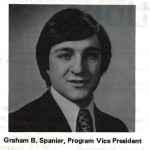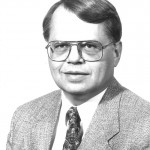Leadership in 1978–79

Paul Glick
¶ 1 Leave a comment on paragraph 1 0 Paul C. Glick, the 36th President of NCFR, was a well-known family demographer. He worked for 40 years at the Bureau of the Census and was also a distinguished scholar and adjunct professor in the Department of Sociology at Arizona State University. He was born in 1911 and died in 2006 at the age of 95. An award was established in his honor at DePauw University. This award is given annually to a DePauw senior who has demonstrated academic excellence in the Sociology and Anthropology Department.
¶ 2 Leave a comment on paragraph 2 0 In his Presidential Address, Glick made the following observations:
¶ 3 Leave a comment on paragraph 3 0 NCFR members tend to follow the divorce patterns of social scientists in the United States. They have twice as high a proportion of divorce as other professional records. Moreover, the proportion of divorce for social scientists was exceeded by only a few other categories of professional records. Among those were actors, airplane pilots, and female accountants.
¶ 4 Leave a comment on paragraph 4 0 His obituary read as follows:
¶ 5 Leave a comment on paragraph 5 0 Paul C. Glick, 95, died in Tempe, AZ, on January 19, 2006 after a brief illness. He led an active and fulfilling life. His career as a social scientist, which spanned seven decades, was one of enormous achievement and contribution. Fifteen years ago, a symposium was held at Arizona State University to honor Paul on his 80th birthday and to recognize his extraordinary contributions to the field of marriage and family sociology and demography. Speakers at the symposium included Graham Spanier, Arland Thornton, Suzanne Bianchi, Larry Bumpass, and Arthur Norton. Each speaker in turn reflected upon Paul’s invaluable legacy to the social sciences.
¶ 6 Leave a comment on paragraph 6 0 Paul was extolled as a dedicated public servant, a man who created a true research environment at the Bureau of the Census. He attracted young scholars to the arena of marriage and family studies, and was an inspiration to those who know the importance of translating complex data sets into useful and understandable information about important trends, thereby reaching the widest audience possible. After listening to those reflections, which accurately summarized his impact on so many of us, Paul, in his usual self-effacing way, remarked that all the hyperbole was unwarranted. I think not. Paul’s personal bibliography contains a vast wealth of books, papers, and lectures. His awards have been many—including the Department of Commerce’s Gold Medal; its highest award for achievement by an individual employee. Beyond these recognitions, perhaps Paul’s most lasting contribution to his profession was that he was the driving force behind the development of concepts and strategies governing the processing, presentation, and analyses of data on marriage, families, households, and living arrangements—nearly all of which are still in use throughout the social science community.
¶ 7 Leave a comment on paragraph 7 0 Paul loved life, his family, and his work. He was a genial and sensitive man without malice toward others. Those of us who were privileged to be among his colleagues and friends have been most fortunate. (By Arthur Norton)
Gallery
- Graham Spanier
- Arland Thornton




Comments
0 Comments on the whole Page
Login to leave a comment on the whole Page
0 Comments on paragraph 1
Login to leave a comment on paragraph 1
0 Comments on paragraph 2
Login to leave a comment on paragraph 2
0 Comments on paragraph 3
Login to leave a comment on paragraph 3
0 Comments on paragraph 4
Login to leave a comment on paragraph 4
0 Comments on paragraph 5
Login to leave a comment on paragraph 5
0 Comments on paragraph 6
Login to leave a comment on paragraph 6
0 Comments on paragraph 7
Login to leave a comment on paragraph 7